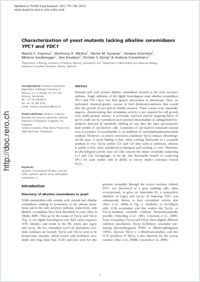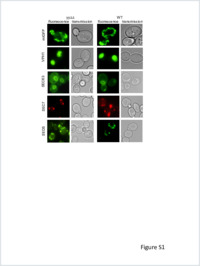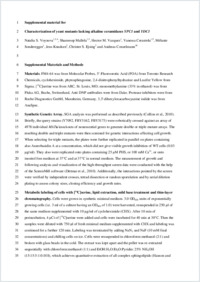Characterization of yeast mutants lacking alkaline ceramidases YPC1 and YDC1
- Voynova, Natalia S. Department of Biology, University of Fribourg, Fribourg, Switzerland - Temasek Life Sciences Laboratory, National University of Singapore, Singapore City, Singapore
- Mallela, Shamroop K. Department of Biology, University of Fribourg, Fribourg, Switzerland
- Vazquez, Hector M. Department of Biology, University of Fribourg, Fribourg, Switzerland
- Cerantola, Vanessa Department of Biology, University of Fribourg, Fribourg, Switzerland - Philip Morris Products SA, Neuchatel, Switzerland
- Sonderegger, Mélanie Department of Biology, University of Fribourg, Fribourg, Switzerland
- Knudsen, Jens Department of Biochemistry and Molecular Biology, University of Southern Denmark, Odense, Denmark
- Ejsing, Christer S. Department of Biochemistry and Molecular Biology, University of Southern Denmark, Odense, Denmark
- Conzelmann, Andreas Department of Biology, University of Fribourg, Fribourg, Switzerland
-
01.08.2014
Published in:
- FEMS Yeast Research. - 2014, vol. 14, no. 5, p. 776–788
English
Humans and yeast possess alkaline ceramidases located in the early secretory pathway. Single deletions of the highly homologous yeast alkaline ceramidases YPC1 and YDC1 have very little genetic interactions or phenotypes. Here, we performed chemical-genetic screens to find deletions/conditions that would alter the growth of ypc1∆ydc1∆ double mutants. These screens were essentially negative, demonstrating that ceramidase activity is not required for cell growth even under genetic stresses. A previously reported protein targeting defect of ypc1∆ could not be reproduced and reported abnormalities in sphingolipid biosynthesis detected by metabolic labeling do not alter the mass spectrometric lipid profile of ypc1∆ydc1∆ cells. Ceramides of ypc1∆ydc1∆ remained normal even in presence of aureobasidin A, an inhibitor of inositolphosphorylceramide synthase. Moreover, in caloric restriction conditions Ypc1p reduces chronological life span. A novel finding is that, when working backwards as a ceramide synthase in vivo, Ypc1p prefers C24 and C26 fatty acids as substrates, whereas it prefers C16:0, when solubilized in detergent and working in vitro. Therefore, its physiological activity may not only concern the minor ceramides containing C14 and C16. Intriguingly, so far the sole discernable benefit of conserving YPC1 for yeast resides with its ability to convey relative resistance toward H₂O₂.
- Faculty
- Faculté des sciences et de médecine
- Department
- Département de Biologie
- Language
-
- English
- Classification
- Biological sciences
- License
-
License undefined
- Identifiers
-
- RERO DOC 211339
- DOI 10.1111/1567-1364.12169
- Persistent URL
- https://folia.unifr.ch/unifr/documents/303711
Other files
Statistics
Document views: 172
File downloads:
- Texte intégral: 214
- Additional material: 139
- Additional material: 124


